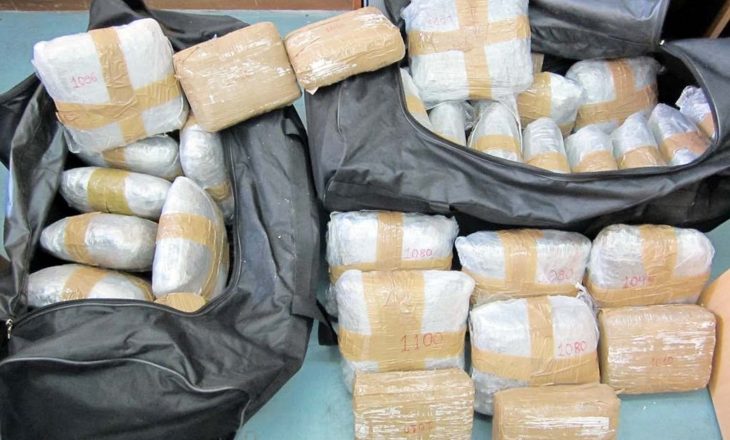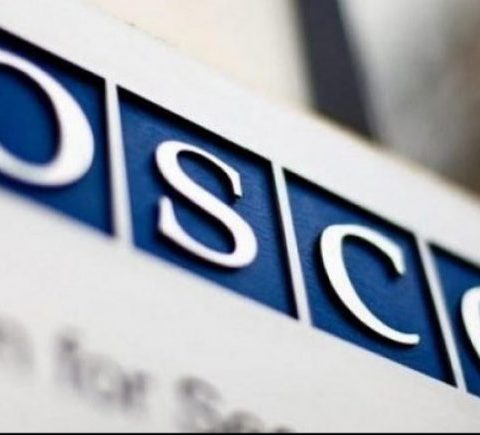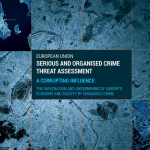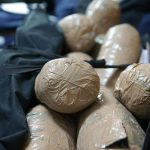TIRANA, Feb. 28 – Albanian police seized 613 kg of cocaine – the biggest quantity ever seized – valued €180 million in the market inside a container importing bananas from Columbia to the DurrÑ‘s port on Wednesday.
Two 25-year-olds have already been arrested, while the owner of the import company Arbri Garden, allegedly residing in Germany, is currently wanted by the authorities.
The narcotics were thought to have been part of a wider drug trafficking network which begins in Columbia, uses Albania as a transit state and then, through Albanian organized crime gangs, passes on to the European market.
Gov’t: Undeniable success
State police told the press this operation was an undeniable success for Albanian authorities, made possible by the close cooperation among state police, border control agencies and the Serious Crimes Prosecution.
They added the operation was conducted without the assistance of international partners.
Prime Minister Edi Rama said the successful operation is an indicator the country is gaining determination, readiness and skill in the battle against organized crime.
Rama also said this was by far the biggest amount of cocaine busted by authorities in the country and that it was the rigorous work of the government that enabled it.
Minister of Interior Fatmir Xhafaj, however, was criticized for opposing Rama’s statement and saying it was Italian authorities that gave police a heads-up, and then coming out and saying the communication between the Albanian part and international actors was done only after the operation had succeeded.
Opposition: Organized crime entrancement
Head of the opposition’s Democratic Party (DP) Lulzim Basha, on the other hand, did not see the arrest as a success story, but as an indicator of the alleged ties between the government and organized crime.
“The mafia is tied to the government and has taken over the police. A single load is worth €180 million. The cannabis period has now been enriched with heroine, cocaine and money laundering,” Basha said.
He added this is an existential crisis for Albanian society, as criminality has now become an integrated part of politics and economy.
In a Facebook post, he also directly accused Rama as the protection point of all narcotics gangs dealing both soft and hard drugs and operating in Albania, and said there was no way the big amount of cocaine could pass through the country without political guarantee.
President: More successes like this needed
President Ilir Meta, in a statement, after hailing state police for the successful operation, called for an intensified cooperation between Albanian law institutions and international partners, saying that strengthened organized crime is a great hazard to national security.
He also hailed Italian anti-mafia for doing a good job in warning not only Albania, but the entire region, on upcoming dangers.
To conclude, Meta stressed the importance of strengthening state border security to successfully fulfill legal and constitutional obligations.
Int’l partners praise authorities
US Ambassador Donald Lu and the US Drug Enforcement Agency (DEA) congratulated Albania on the operation, saying this is a positive indicator of police vigilance, but also adding it is a worrying indicator of growing narcotics’ trafficking in the region.
Similarly, the European Union (EU) said in the war against drugs, criminals should not be allowed to win.
Experts’ opinions
Several analysts have drawn attention to different, less-mentioned sides of the issue.
To begin, this operation made it clear that in addition to cannabis cultivation, which has almost turned into a national economic strategy over the past years, the country is also a transit state and route for hard drugs destined for European markets.
This particular amount, for example, is thought to have been destined for Germany, where the Arbri Garden’s owner resides.
This makes Albania as important in the success of drug distribution as the origin state is, making efforts against cannabis cultivation insufficient in the overall war against drugs and criminality.
Other financial experts have alleged that only about 10% of the drugs trafficked manage to get seized. It is fair to wonder where the rest of the money goes, and what purpose it serves in a country where corruption accusations have been factualized a long time ago.
Last, but not least, politicians boasting for the lack of help from international partners has been seen in negative light by some analysts, who drew parallels with the Habilaj case and the Italian authorities’ handling of the matter.
Though arrests were made, analysts noted, the big heads of this operation are nowhere to be found. In the current scenario, it is the small fish who are suffering the consequences – the drivers, the warehouse managers, etc.
Though part of the network, analysts have argued it would have been better for police to follow the lead and, by communicating with international partners, work to uncover those responsible for drug trafficking once and for all.
In the Habilaj case, Italian authorities waited for over four years to gather evidence that would lead them straight to the source.
Though Albanian authorities were successful in seizing this load, they acted hastily and, put in perspective, the operation did not succeed in arresting the people who will, most probably, again use Albania as a transit state for hard drugs to reach wealthy European markets.










